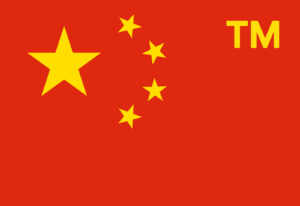The Four Best Ways to Protect Your IP from China
1. Protect Your IP from China by Registering your IP in China
The single best way to protect your Intellectual Property from China is to register your IP in China. This means registering your trademarks, copyrights, and patents in China. Registering your IP in the United States or the EU or Australia or Hong Kong or any other country does not provide you with IP protection in Mainland China.
China Trademarks
Registering trademarks in China is usually fast, easy, and inexpensive. If you plan to sell your products or services, or even just manufacture them in China, registering your trademark there is essential.
China operates on a first-to-file trademark system, meaning whoever registers a trademark first secures the trademark rights, regardless of prior use.
Chinese squatters are constantly on the lookout for up-and-coming startups whose trademarks they can register in China and use for “ransom.” Chinese squatters also love securing the trademarks for brand names of products made in China for export. Often, these squatters are friends or family of your own manufacturer who register “your” trademark in China. They then use that registration to increase your manufacturing costs and hold you hostage when you try to switch to another manufacturer. See Why Changing China Suppliers Can Be So Risky, where we described this typical scenario:
Western company tells its China manufacturer it will be ceasing to use China manufacturer for its production. A few weeks later, Western company has its products seized at the China border for violating someone’s trademark. The Western company is (rightly) convinced that its China manufacturer is the one behind the product seizure, believing the Chinese manufacturer registered the Western company’s brand names as trademarks in China long ago and is just now using that trademark to seize product as revenge. China has laws forbidding its manufacturers from registering the trademarks of those for whom it manufactures, but because it is usually not possible to prove that your manufacturer in Shenzhen had a cousin in Hengyang do the registering, this sort of thing goes on unchecked. This is increasingly happening with design patents as well.
China Copyrights
Copyrights are automatically protected in China under the Berne Convention. However, to sue quickly for a copyright violation and have full protection, you must usually file your copyrights in China.
Just as in the United States and the EU, you need only submit a small portion of your software code to secure copyright protection on the entire software program.
China Patents
China patents typically must be filed in China before any public disclosure. However, in some cases, the application can be valid if filed within 12 (sometimes more) months of your first foreign patent filing. China also has design patents which are shockingly fast and easy to secure. See China Design Patents: The Extreme Basics.
In most instances it will also make sense for you to secure the appropriate trademarks, copyrights and patents in whatever country you will be selling your product.
2. Protect Your IP in China With China-Centric Contracts
Having a good contract with anyone in China to whom you will be revealing your IP is the second key to avoiding IP disputes in China and to prevailing in such disputes. The right contract or contracts will depend on your specific situation.
The most common contract for IP protection is an NNN Agreement. An NNN Agreement stands for Non-Disclosure, Non-Use, and Non-Circumvention agreement. It’s a more robust version of a Non-Disclosure Agreement (NDA) commonly used in Western countries. While an NDA focuses solely on keeping your information confidential, an NNN Agreement goes further. It prevents your partner from using your confidential information for their own benefit (Non-Use) and from bypassing you to directly engage with suppliers or customers (Non-Circumvention).
It also might make sense for you to have a trade secret agreement, a non-compete agreement, a confidentiality agreement, a non-use agreement, a licensing agreement, or many other sorts of contracts tailored to your specific situation. For making sure whatever contract you use to protect your IP actually works for China, check out Drafting China Contracts That Work.
In addition to registering your IP in China and having China-centric contracts to protect your IP in China, performing takedowns of products on Chinese websites that infringe your IP and registering your IP with China customs also usually make sense since these two things are both effective and relatively inexpensive.
3. Perform Takedowns on Chinese Websites (and Enforce Your Rights More Generally).
Once you have registered your IP in China, you will be well prepared to perform takedowns of infringing products you find on Chinese websites. This is especially true of products that violate your China trademark or images of products that violate your China copyrights.
The major Chinese online marketplaces all have their own takedown procedures which typically require you prove your identity and your company’s bona fides. and that you possess the rights to the IP being infringed. Our law firm’s China IP lawyers and paralegals usually can accomplish a takedown of infringing IP from a Chinese online marketplace in a week or two. See Copyright Takedowns in China, in which we discussed the regulations that establish China’s copyright takedown procedures, how China’s takedown regulations apply to cloud service providers. and how “the single most important thing you should do is register your copyright in China before seeking a China takedown. See also Protecting YOUR Intellectual Property From Alibaba and Other Chinese E-Commerce Sites.
In addition to takedowns, you should enforce your IP rights more broadly. Develop intelligence on your counterfeiters’ operations and look for opportunities to take action against the factories making the fakes, the warehouses stashing them, those who are wholesaling and retailing them, and even the malls that rent space to counterfeiters. Even online sellers can present suitable targets for litigation. In addition to taking counterfeits off the market, you may be able to obtain damages, which at a minimum could help fund brand protection efforts.
Though takedowns are a valuable tool for removing infringing products from online marketplaces, they have limitations. Takedown procedures can sometimes be time-consuming, and new listings may appear quickly. Additionally, takedowns may not be effective against counterfeiters operating outside major online platforms.
In some cases, takedowns may be just the first step, and you may need to consider pursuing legal action against manufacturers, wholesalers, or retailers of counterfeit goods. This can be a complex process, and consulting with an international IP litigator is highly recommended.
4. Register your IP with China Customs and the Customs Office in Your Import Country
China Customs will block products that infringe on China IP from entering or leaving China. The “leaving China” part is why it is essential that you register your IP in China even if all you are doing in China is having your products made there.
The leaving China part is also why it usually makes sense for foreign companies that have registered their IP in China to register that IP with China customs. China still manufactures way more than any other country in the world, and it is also by far the world center for counterfeiting. If you register your IP in China and also register that IP with China Customs, you will be able to block counterfeit versions of your products from leaving China for anywhere in the world.
For most countries, it will also make sense for you to register your IP to block infringing imports.
Conclusion
Protecting your intellectual property from China requires a proactive approach. By registering your IP in China, having strong China-centric contracts in place, and taking steps to enforce your rights, you can significantly reduce the risk of IP theft and counterfeiting.
While our primary focus in this post has been on protecting your IP in China, registering your intellectual property in your home country is also crucial. This ensures you have legal recourse for infringements occurring in your domestic market and strengthens your overall brand protection strategy. Securing appropriate IP protection in your home country can further strengthen your global brand protection strategy.
IP protection is an ongoing process, and staying vigilant in monitoring all relevant markets for infringements is crucial to protecting your IP.

























